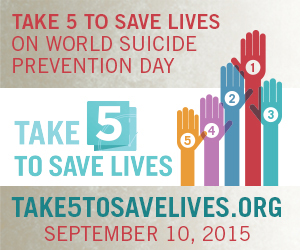Suicide Prevention For The Other 364 Days

Today is World Suicide Prevention Day and this week is dedicated to suicide prevention in the US. You may have seen many efforts to call attention to the need for suicide prevention recently. However, public concern only rises when a suicide draws a lot of attention, and then apathy returns after a few days or weeks until the next time.
There are a number of reasons for the lack of community support. Suicide is still highly stigmatized and this keeps many people from getting involved. Suicide is the subject of many myths and misconceptions. Some don’t believe that suicide is preventable.
In our region, one to two suicides occur every day. Scores of people make attempts and hundreds more are troubled by severe thoughts of suicide. The police, ERs, and crisis centers deal with suicidal behavior 24/7. Suicidal behavior is a major community problem. What can we do?
Here are the "must do's":
- Immediately call 9-1-1 if someone threatens to kill herself or himself, if someone is looking for ways to kill herself or himself, or is talking about suicide or wanting to die.
- Get help for anyone voicing hopelessness, a sense of not belonging, or losing control, or who is withdrawing from family and friends or who has dramatic changes in mood.
- Understand that anyone who has made a suicide attempt is at high risk and may need support and counseling to cope with the aftermath.
Here are some "should do's":
- Urge primary care physicians to post the warning signs of suicide in their exam rooms and to screen patients for depression and suicide risk
- Contact local police about disposing of unnecessary firearms; secure any firearms in the home in tamper-proof gun cabinets or safes
- Promote public awareness that alcohol use is involved in many suicide completions and attempts because it worsens depression and increases impulsiveness
And here are some "could do's":
- Discourage lurid media coverage of suicides that give unnecessary and potentially harmful references to the means, site, and rationale for the act.
- Request that websites for high risk groups (e.g., veterans, police officers, mental health consumers, etc.) post the National Suicide LifeLine (800-273-8255).
- Ask what care and residential programs for the elderly are doing to make their staff and their residents aware of suicide risk in the aged.
All of these are do-able "grassroots" steps that you can take.
Suicide prevention must be everybody's business.


